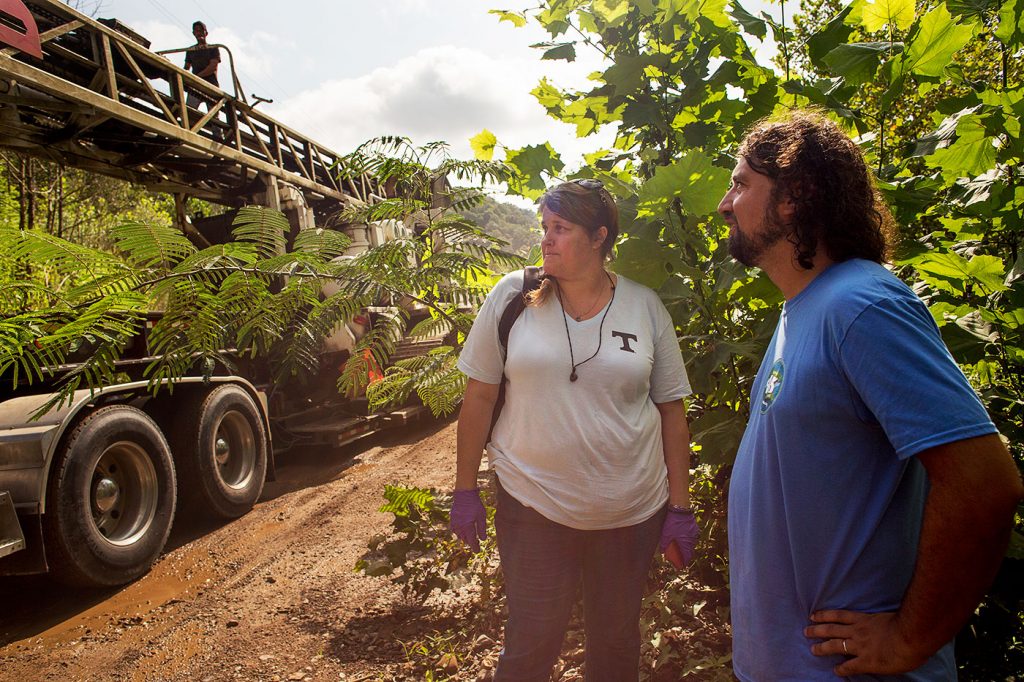ALL, Blogroll, News
Massive Mountaintop Removal Mine Threatens Clearfork Valley
Thursday, September 14th, 2017

April Jarocki and Appalachian Voices’ Matt Hepler stand next to mining equipment next to the Hatfield Cemetery near Cooper Ridge Mine.
RSVP to attend a public hearing on September 20 to voice your opposition to this mine.
The devastating practice of destroying entire mountains and disposing of mining-waste into headwater streams is still happening across the Appalachian region. For folks living beneath these mines, the assertion that mountaintop removal is over can feel like a slap in the face. Despite dynamics and shifts in energy markets, when there is a mountaintop removal mine above your community, the issue is as dire as ever.
The Clearfork Valley of Tennessee has been intensely surface-mined going back decades. As a result, the ridges and hillsides of Campbell and Claiborne counties display a patchwork of mining scars in various states of affliction and gradual healing. Some of these scars are pre-regulation Abandoned Mine Lands while others illustrate the failures of common reclamation standards. The area’s waterways are contaminated to varying degrees with metals, salts and sediment, and support far less aquatic life than they once did.
Now, Kopper Glo Mining is moving forward with a nearly 1,500-acre mountaintop removal mine on Cooper Ridge, dealing yet another massive blow to the ecology and communities of this beautiful and resilient area.
Agency missteps in the permitting process
Kopper Glo began operations on Cooper Ridge Mine this past spring, clearing initial, albeit insufficient, regulatory hurdles. Now the company is seeking a Phase II National Pollutant Discharge Elimination System permit required under the Clean Water Act for discharging pollutants into public waterways. The second phase allows the company to release higher levels of pollutants than allowable under the Phase I permit.
The Tennessee Department of Environment and Conservation’s (TDEC) issuance of water pollution permits in phases is a notable problem. This allows the agency �” whose mission includes “protecting and improving the quality of Tennessee’s air, land, and water through a responsible regulatory system” �” to ignore the true total impacts of a mining operation on adjacent waterways by only considering portions of the mine’s impacts at any one time.
Another issue is that Kopper Glo and regulatory agencies consider this operation a “re-mining” project, suggesting that the area is already impacted by mining and that the Cooper Ridge mountaintop removal mine will serve to reclaim and improve previously mined areas. The truth is that only around one-third of the permitted area has been impacted by older strip mines. Rather than repair old scars of mining, the Cooper Ridge permit will simply triple the footprint of mining on this mountain.
Finally, Kopper Glo has a long history of violations at other mines in the area. Regulatory agencies like TDEC and the federal Office of Surface Mining Reclamation and Enforcement should not be so quick to grant additional permits to a company that has consistently demonstrated either an inability or unwillingness to operate within the confines of the law.
What’s wrong with this mine?
Any surface mine of this size will have severe impacts on ecology and nearby communities. This is especially true in areas like East Tennessee, where headwater streams abound and where homes are crowded into narrow valleys often right at the toe of mining operations. Concerns include excessive runoff, sedimentation of streams, alterations to groundwater hydrology and the discharge of high levels of selenium and other harmful substances into waterways.
In addition to adverse impacts to ground and surface water, the Cooper Ridge mine threatens important local community and cultural assets. The permit boundary sits just a half-mile behind Clairfield Elementary School, presenting concerns for the health and safety of the students, teachers and community members engaged in activities at the school. The mine also surrounds the historic and still-in-use Hatfield Cemetery �” an area where logging related to the mine has already occurred and where mine workers are now parking trucks and equipment.
Speak out against the Cooper Ridge mountaintop removal mine
You can support residents of the Clearfork Valley by attending a public hearing on September 20 to voice your opposition to this mine. The hearing will be held from 7:00-9:00 p.m. in the Recreation Building at Cove Lake State Park, 110 Cove Park Ln., Caryville, TN. Visit this page to RSVP, find a ride and connect with other people and resources if you’d like to attend this hearing. If you can’t make it to the hearing but want to make sure your voice is heard, you can submit a comment to the Tennessee Department of Environment and Conservation.
Whether you speak out at the public hearing or submit your comments online, preparation and clarity are key. Feel free to utilize any of the talking points below in developing your comments.
Talking Points
- Permitting in Phases: TDEC must consider all of the discharges from the entire proposed mine in a single permit process. By issuing water pollution permits in at least two separate phases, TDEC has failed to account for the full impact to the receiving streams.
- Impacts of Re-Mining: TDEC should not assume that re-mining will lead to an overall decrease in pollution from the site. In fact, evidence suggests that streams in the Clear Fork watershed have only recently begun to recover from the pollution impacts of historic mining and that recent mining has started to reverse that trend.
- Compliance History: The agencies should not reward a chronic violator with permits for a new surface mine. The permit application lists at least 17 notices of violation from OSM to Kopper Glo for its other coal mining operations in less than three years, including many violations related to water quality.
- Cumulative Impacts: Permitting authorities must address the cumulative impacts of water pollution discharged from all existing and proposed strip mines in the Clear Fork watershed before issuing any new permits.
- Selenium: The draft permit violates the Clean Water Act because it fails to fully evaluate the reasonable potential of discharges from the mine to violate water quality standards for selenium. Given that selenium is known to be present in variable concentrations in coal seams in Tennessee, TDEC should require the applicant to conduct and report representative core sampling to determine whether selenium is likely to be present in the coal to be mined from the site.
- Groundwater Impacts: This mine would affect groundwater because it will change the hydrology of the east side of Cooper Ridge and release pollutants now contained in the coal and the overburden at the site. Groundwater and surface water resources are closely connected in this area. There are at least seven households and two churches that use springs or wells for their water supply.
- Impacts on Sensitive Species: The blackside dace, a freshwater fish, is protected as threatened under the federal Endangered Species Act, in part because of pollution from surface coal mining. The Cooper Ridge mine will discharge polluted runoff water to tributaries of the Clear Fork, an important corridor that blackside dace use seasonally to seek spawning habitat in smaller streams. Blackside dace are extremely intolerant of elevated conductivity levels caused by dissolved solids from polluted mining runoff. Any discharge permit for the mine must impose limits on conductivity to avoid further harm to blackside dace.
- Community Cemetery: This mine will be near family cemeteries which must be protected. Community members must be able to access family cemeteries on Cooper Ridge, and we ask that the deep mine portal be moved further than 100 feet away from the Hatfield Cemetery.
- Economics: Tourism is important to the current and future economy of Tennessee. The Tackett Creek Wildlife Management area surrounds the proposed Cooper Ridge mine. This area has great potential for increased ecotourism that can benefit Tennessee’s economy more than another strip mine.









